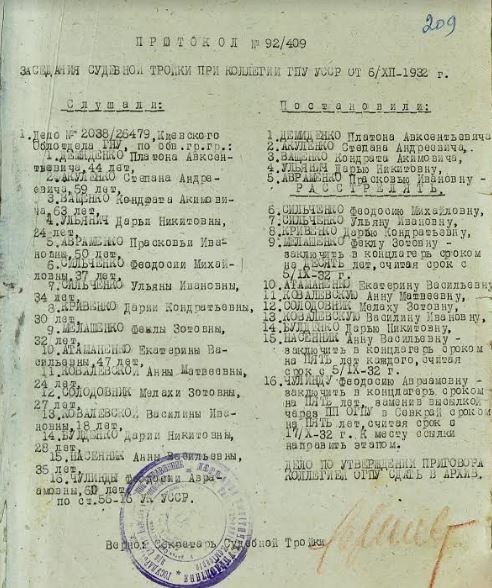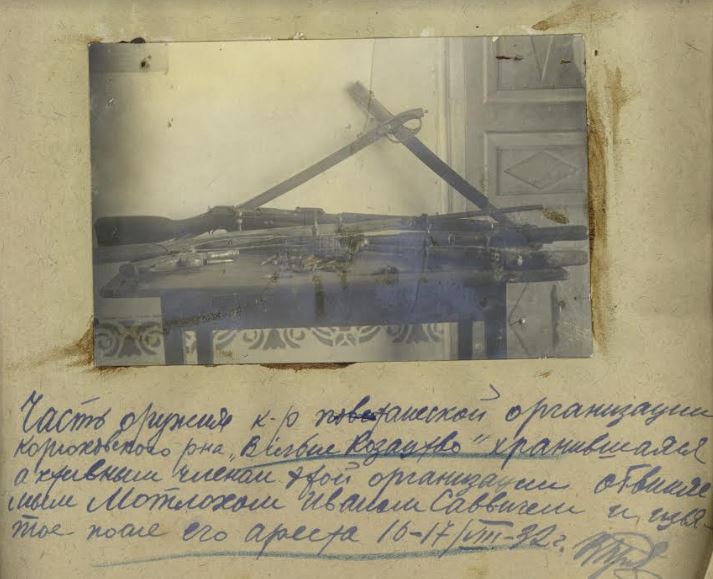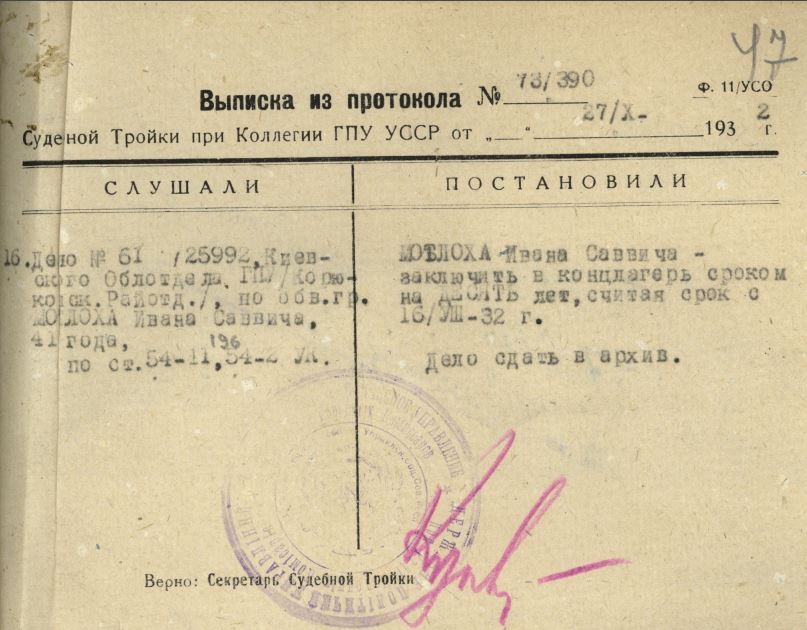Previously unknown documents reveal the scale of Soviet repression against peasant dissenters against collectivization and forced expulsion of products during the Holodomor, Stalin’s genocidal famine that took at least 4 million lives during 1932-1933. The devastating famine was kept a secret during Soviet times.
Read more: Holodomor: Stalin’s genocidal famine of 1932-1933 | Infographic
For the 84th anniversary of the Holodomor, the Center for researching liberation movements Research Center together with the archive of Ukraine’s Security Service (SBU) have published a collection of KGB documents detailing the repression against those who resisted starvation via the Holodomor. The collection can be viewed in the electronic archive of the liberation movement avr.org.ua.
The documents stored in the SBU State Archive are a valuable historical source for the study of the Holodomor of 1932-1933. Ukraine. During the Soviet period, they remained inaccessible to researchers and the public.
According to the director of the Archive of the SBU Andriy Kohut, documents concerning the Holodomor are now being surveyed, systematized, declassified, and published.
One case hosted online is of Ivan Motlokh, a participant of the so-called counter-revolutionary movement resisting forced collectivization called “Free Kozaks,” who was arrested on 17-18 August 1933 and sentenced to ten years in a concentration camp.
On 7 August 1932, the Central Executive Committee and Council of People’s Commissars of the USSR adopted a resolution “On protection of property of state enterprises, collective farms, and cooperatives and strengthening community (socialist) property.” It “protected” the recently expropriated “socialized” property taken away from farmers of their attempts to return it and provided severe penalties – execution or 10 years of imprisonment in labor camps. The resolution was dubbed “The law of five spikelets,” as it was actively used in the grain procurement campaign. It opened the door for the genocidal famine that would take away at least 4 million lives in the following winter.
Read also: How Stalin crushed the Euromaidan of 1930
Over 21,000 archival criminal cases relate to the repression carried out in 1932-1933.
“The totalitarian system not only killed by hunger, it also repressed all those who tried to resist, or even just to tell the truth about what is really going on,” told Andriy Kohut.
The collection of the documents published online contains illustrative documents contained in criminal cases. Most of them are machine typed indictments.
These figures in the cases were charged with resisting the forced expropriation of grain, concealing or stealing it, “counter-revolutionary” propaganda against collectivization, excessive taxation and grain collection, as well as committing terrorist acts against Soviet authorities and activists.
A protocol of an NKVD “troika” dated 6 December 1932 recorded that 5 peasants resisting collectivization would be shot, 4 sentenced to 10 years and 7 – to 5 years in a concentration camp. Peasants agitating against the collectivization measures and Soviet authorities were repressed also. For instance, Timofei Berezhnoi, who was spreading messages such as “kolkhozes [Soviet state farms] are death for the population, and the kolkhoz workers will die from hunger” and urging kolkhoz workers to boycott work until they are given food was sentenced to three years in a concentration camp.
Those that couldn’t meet the unrealistic grain procurement quotas that the Soviet government set for the planned economy were also harshly punished. One document contains the case of a peasant who cheated around the quotas, receiving a receipt for submitting 97 kilos of grain when he only gave in 27, who received a death sentence. The receipt-giver was sentenced to 10 years in a concentration camp and confiscation of all property.

“These archival documents about repressions during the time of the famine show that despite the difficult situation, Ukrainians attempted to resist the murderous expropriation of products and were not afraid to speak the truth. For resisting the Holodomor, they were subjected to repressions. There very many of these documents and they are still waiting for their researchers,” told Kohut.
The documents are available in the online archive of the liberation movement.
Last year, the center published documents detailing how the Soviet leadership exported various food products to west European countries during the Holodomor, leaving their own citizens to starve to death.
Read more: Documents show massive export of products from Ukraine during Holodomor
The Electronic Archive avr.org.ua was opened in March 2013 It is a joint project of the Liberation Movement Research Centre, the Ivan Franko Lviv University and the National Museum Prison on Lonskoho. 23,839 copies of documents are currently available at the E-archive. The mission of the project is to make the past accessible.






